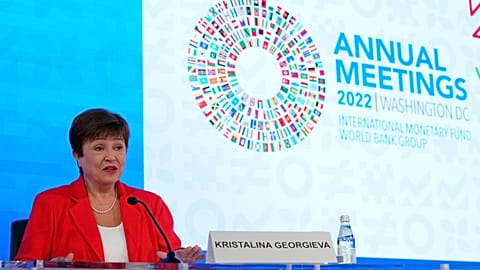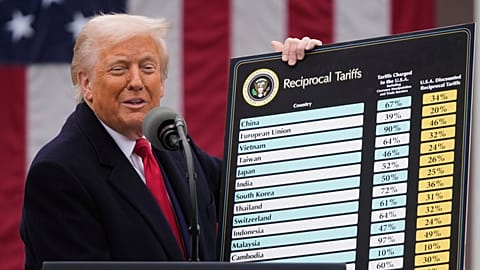The UK pound tumbled on Monday while the cost of borrowing soared to a higher level than that in Greece or Italy, the eurozone's most indebted members.
Fears have been expressed that the market turmoil in response to the new British government's financial plan could further weaken Europe's economy.
 ADVERTISEMENT
ADVERTISEMENT
 ADVERTISEMENT
ADVERTISEMENT
The pound tumbled further later on Monday despite efforts by Britain's finance ministry and the Bank of England to reassure financial markets. Earlier it had rallied after falling to a record low against the US dollar overnight.
Traders are shying away from the British currency after the Chancellor (finance minister) Kwasi Kwarteng announced on Friday a big tax-cutting plan designed to grow the economy — funded by huge increases in government borrowing — raising fears that inflation, currently at 9.9%, could spiral further.
The cost of borrowing for the UK rose sharply on Monday, with yields on the UK's five-year bonds soaring to a higher level than those in Greece and Italy. That implies that markets see more risk in the UK's medium-term debt than those of the eurozone's most indebted members.
In a move to reassure markets, the UK Treasury said Kwarteng would set out a medium-term fiscal plan on November 23, alongside official growth and borrowing forecasts.
Earlier, the Bank of England said it would not hesitate to change interest rates to curb inflation and was monitoring markets "very closely", after the pound earlier went into a tailspin.
But it only promised to act "at its next meeting" on November 3, quashing rumours of an emergency BoE meeting that had helped the pound to rally temporarily. In response, the UK currency immediately fell again to under $1.07 (€1.11) 18:00 CET, approaching its all-time low of just above $1.03 (€1.07) reached early on Monday.
A top official at the US central bank said the UK's fiscal plan increased economic uncertainty and could have a knock-on effect in Europe and the wider global economy.
"The reaction to the proposed plan is a real concern," showing increased uncertainty about the UK's economic prospects, said Raphael Bostic, president of the Atlanta branch of the Federal Reserve. "The key question will be what does this mean for ultimately weakening the European economy, which is an important consideration for how the US economy is going to perform."
Analysts and investors said the government had done the bare minimum to reassure markets.
"There seems no reason to believe that markets will give the government the benefit of the doubt ahead of a new fiscal plan by Kwasi Kwarteng," said Chris Scicluna, head of economic research at Daiwa Capital Markets.
Markets are worried about the British government's plan to pay energy bills and cut taxes, estimated by economists at between £100-200 billion (€111-222 billion), the financing of which remains unclear while its impact on the UK economy has not been studied.
The reaction adds to pressure on Prime Minister Liz Truss' new government, less than a month after it took office following the resignation in July of her predecessor Boris Johnson.
Some Conservatives have welcomed the tax-cutting moves as a return to free-market values, but others worry the government will rack up huge debts that taxpayers will eventually have to pay.
Opposition Labour Party economy spokeswoman Rachel Reeves accused the government of “a return to trickle-down economics, an idea that has been tried, has been tested and has failed”.
“They are not gambling with their money — they are gambling with yours,” she told an audience at the party’s annual conference on Monday.
The recent rise in the US dollar against other currencies is a concern for many countries. Elsewhere in Europe, markets were mostly lower as fears of a recession grow.
The head of the European Central Bank warned that the economic outlook “is darkening” as high energy and food prices pushed up by the war in Ukraine sap consumer spending power.
France, the EU's second-biggest economy, forecast a substantial slowdown in economic growth next year as it announced its draft spending plans.

















